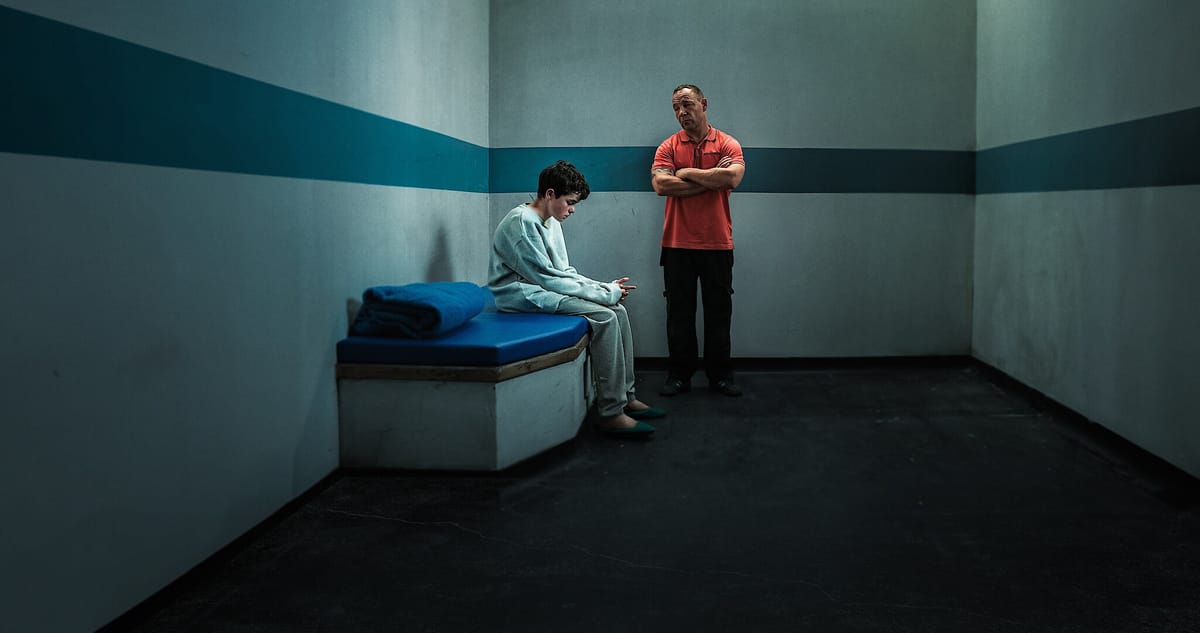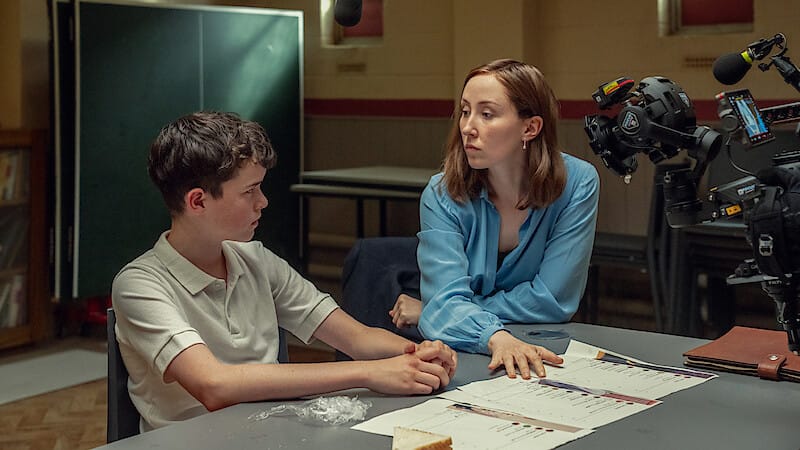"Adolescence" Hits Hard: “If My Dad Made Me, How Did I Make That?”

Let’s begin with a spoiler alert I’ll leave in lower case letters, although on paper it could seem a real doozy. That said, in in the bravely conceived and delivered dramatic foray that is “Adolescence,” it serves simply as prelude to a much more significant series of creative revelations.
In this thoroughly British if resoundingly universal four-parter, there’s a murder that turns an entire small city upside down.
The reveal, after young teen Jamie Miller’s vivid arrest, comes just minutes into the opening episode. Here’s how this effort’s key man--co-creator, co-writer, and lead actor Stephen Graham—told Jimmy Fallon the essence: “It’s the story of a young boy who kills a young girl. He’s convicted of a murder…it’s not a “who” but a “why?’”
The latter question, of course, is not easily summed up, though the series is no less powerful for shouldering that complexity. The quote in the headline above is uttered by Graham’s Eddie Miller, and what he’s considering is more urgent than ever before--what do we, in the 21st Century, know about child-rearing? What are the consequences, and who’s to blame, if it all goes awry?
Have we so-advanced humans lost the passwords to the codes technology throws at us? And why our bewilderment as we try to make child raising a science? Maybe it is really…an art?
Just to let technology wave its forked tail (and you know Elon Musk has one stuffed down the back of his black jeans), as we watch we are forced to ponder anew: just what is the actual effect of the phone and social media addictions the tech overlords have so zealously inculcated in our children?
As Jack Thorne, longtime collaborator with Graham and co-author with him of these four episodes, told The Guardian, “Put 3,000 kids in the same situation and they wouldn’t do what [Jamie] did. Yet spend any time on forums on 4chan or Reddit, spend any time on most social media platforms, and you end up, quite quickly, in some dark spaces.*
And however remorselessly malign may be the mandarin tech bros who arrayed themselves in servile courtier poses behind Trump during the low point in autocratic oratory that was his inauguration day, can their (dis-) information takeover be stemmed, or are we fully in an era where greed is good ?
The smart and compelling stratagem adopted by Stephen Graham, as a canny producer, is to personalize all this—to reframe the conversation by showing us the hurt and woe our muddled parenting has caused. It resides in his quote above—a desperate wondering of how do we think about the unthinkable? And what can we know, when the glass breaks or the weapon smokes or clatters, about the cause?
Eddie’s line pokes out of a deep conversation with his wife in a mournfully elegiac, heartbroken and heartbreaking, summing up in the closing episode. Another needle-stick as we listen is Eddie’s, “I still see that little boy,” and it’s all the more piercing because it comes out quietly in a resolute, quietly reasoning conversation with wife Mand, played by Graham’s longtime creative colleague Christine Tremarco.
So how did such a tragic turn arrive? That forlorn question is the root mystery of the story that the series uses innovative craftsmanship to tell. Given that the four episodes are each composed in the cameras with the operators literally on the run, with no edits permitted in the episodes of 50-some minutes. It's a bold choice Graham and director Phillip Barantini had tested meticulously before with the well-liked kitchen-life short, and subsequently feature, “Boiling Point.”
The “oner” tactic pays off immediately as the series opens, and we’re drawn in by the sheer familiarity--a pair of been-there, tart-tongued cops move from idly running a surveillance to leading a planned, full-on SWAT team assault.
The target is the home where young suspect Jamie Miller (age 13 as played by brilliant newcomer Owen Cooper, about a year older at that time) is in bed at 6 a.m. as his dad, mom and sister are rousted from morning sluggishness to a smashed-in door and noisy chaos. In the course of the opening scenes, we see Ashley Walter’s seasoned but empathetic Detective Inspector Luker Bascombe and his female partner Misha Frank (nicely underplayed by Faye Marshay) have a quick chat about Luke’s own perhaps under supported, troubled son.
The rest of the episode is all the more authentic thanks to its use of minutiae--the warning notice of rights, the blood test, the summoning of a public defender, the seeming fright and woe of the shy lad we are already marking as an incel--albeit a seemingly innocent one for a few beats.
If it hadn’t already, the camera now fully becomes our own restlessly inquisitive eye as the events of the previous night’s post-10 p.m. violence murkily but unmistakably unfold on CCTV footage as a brutal murder, Jamie the aggressor, by knife. (In an England where guns are still sternly regulated--take a hint, America, and save 17,000 firearm murders a year—a recent annual tally of 22 homicides by gun compares to 262 by stabbing.) It was a casual read of the newspaper that seized Graham’s attention, and when a second teen boy stabbed a second teen girl to death soon after, the losses became a fixation: “Opposite ends of the country,” he has told more than one interviewer, “It rocked me to the core.”
The cat-and-hatchling game of two cops and a near-child working a certain evasiveness is going neutrally at first, but once the stark video plays in the interrogation we see the near-paralytic onset of Eddie’s heart bowing his hunched form as Graham’s work with the previously untested actor becomes near-unbearable–and completely involving--to watch.
Episode 2 is a prolonged scuffle in the calamitous environs of the middle school that sergeant Frank finds stinking of “vomit, cabbage and masturbation” as the search for the murder weapon and whoever provided it breaks into a standard police foot chase. The episode is hardly a throwaway though, as we see Luke’s son--himself subject to the school’s zealous, viral ethos of bullying. The son pulls him aside to school him in the feral and cruel content of trigger-happy posting on Insta and other social apps. (Though sergeant Frank will spit out a contributing cause as “Andrew Tate shite,” which Eddie too will mumblingly despair of later, the name check stands in for the overall, generalized cruelty such apps enable in student cohorts.)
It’s in Episode 3 that so many fascinating threads—Graham and Thorne’s writing with its subtle informativeness and irony, underscored and catalyzed by the camera’s ever-rapt attention, imbues in the ensemble’s actors, per Graham, a “Zenlike flow.”

The episode’s staging in a cavernous yet claustrophobic room feels high-level improvisational at times as the duo unsteadily tiptoes past and nearly into what could become violence; it’s the most riveting fifty minutes I can imagine seeing this year, and perhaps for several to come. (Erin Doherty, so effective and darkly sexual opposite the tortured brawler Graham plays in the twisted love story of the recent “A Thousand Blows,” finds her acting equal in Cooper. He fully earns the compliment used by the New York Times as “astounding." Next up for him--playing young Heathcliff in Emerald Fennell’s coming-in-2026 “Wuthering Heights,” with Margot Robbie on board.)
Episode 4 re-immerses us in the quotidian Life After, with hopes for the nuclear—in truth, post-nuclear--family remnant of three loving, wounded souls planning a cheering birthday excursion. But then some local brats’ tagging of Eddie’s work van with an epithet of `nonce’ (child molester) stirs in Eddie a ravenous but at first banked wrath at the invasive world of stupidity that churns up such slurs and worse, a moronically cheerleading stock boy who recognizes him from Facebook in the local big box hardware store. (The dolt
The dolt's uselss proffer is that he and other Jamie stans would support the teen’s now- tattered “not guilty” plea with a Go Fund Me flail.)
In the ride home in the van (which Eddie has haplessly splattered with paint) a call comes from Jamie’s “secure training facility” (to him, "a madhouse") with some news of a final capitulation to disaster and to the family’s coming excommunication from a caviling local society. Just as Doherty says of her character when things have gone south in the pre-trial psychological profiling that “she has had to let go of everything she wanted this boy to be,” so too Eddie. Or, as rough-hewn saint Eddie says in a crushing soliloquy addressing his own life and his attempted kindnesses that didn’t quite add up to avoiding the worst that could happen: “If my dad made me, how did I make that?”
As adds Doherty, who going forward can and should be mentioned in the same deeply talented Irish-adjacent actress pack as Saoirse Ronan and Jessie Buckley as well as other elite Yank and Aussie contemporaries, the torturous insight is “such a great thing to play.”
That’s said in sheer celebration of the zestful skill that animates the entire effort, and makes this piece of work, so sad and so important, soar above almost anything out there right now on screens large or small. “I took my eye off the ball,” laments Eddie, whom his son mournfully describes as loving “all sport,” and anyone who’s cheered their offspring on will feel the now-brutalized and hopeless parental tenderness.
Graham is taking a proper victory lap in the media, but his aim is clear--the larger victory is so far from won, and what he hopes for this generation and more to come makes the staggering artistry of the dedicated creative company worthwhile --if we’ll just listen: “I hope it creates conversation between parent and child.”



Comments ()